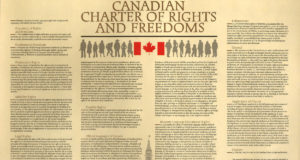There is a lively debate afoot in legal circles, both in the United States and now in Canada, on the “common good.” It began with Adrian Vermeule’s call for a “common good constitutionalism,” in which vague provisions would be infused with values drawn from the Catholic natural law tradition. Many others have now adopted the “common good” moniker, though it ...
Read More »Tag Archives: textualism
The Common Good in Legal Interpretation: A Response to Leonid Sirota and Mark Mancini
A renaissance of interest and juristic thinking about the moral foundations of the law and legal reasoning is underway, and its reverberations have now reached Canadian shores. On February 22, Leonid Sirota and Mark Mancini published a post on the Double Aspect Blog entitled “Interpretation and the Value of Law”.[1] Although the post itself merely claims to show “[w]hy the ...
Read More »A Textualist Critique of Bostock
The Supreme Court of the United States’s recent decision in Bostock v. Clayton Country, Georgia has already elicited a great deal of controversy and scholarly commentary. I typically refrain from commenting on U.S. decisions as I am not an expert on U.S. law. However, the decision in Bostock turned entirely on the application of the principles of statutory interpretation, which has long been an interest of ...
Read More »A New Canadian Textualism Emerges from the Stratasphere
In Entertainment Software Assoc v Society of Composers, 2020 FCA 100, Stratas JA (for the Court) made a number of interesting comments about statutory interpretation in the administrative state and the role of international law in the interpretive activity. In this post, I review these comments, and agree with them wholeheartedly. This case is an important add-on to a growing list of ...
Read More »The “Return” of “Textualism” at the SCC?
Under the so-called “modern approach” to statutory interpretation, courts are instructed to take into account the text, context, and purpose of a statute. But perhaps because the “text, context, and purpose” recital is so commonplace, other difficult interpretive questions are masked under its patina. For example, which takes priority—text or purpose? The Supreme Court has said that clear text is ...
Read More »A Matter of Deductions: Resolving Uncertainty in MVA Litigation
As any Ontario personal injury lawyer knows, the common law of damages has been modified significantly in the context of motor vehicle accidents, to the benefit of defendants and their insurers. The legislature has enacted various measures to limit the ability of plaintiffs to recover in tort. It has done so for two reasons: 1) to help limit the number ...
Read More »Why the Appeal to Charter Values Denies the Rule of Law
Barry W. Bussey is Director Legal Affairs, Canadian Council of Christian Charities. He blogs at: lawandreligion.org. The following is an excerpt of his article, “The Charter is Not a Blueprint for Moral Conformity,” (2017) 79 S.C.L.R.(2d) 367, 393-400 It may be trite to say that a liberal democracy must respect the rule of law.[1] Lord Bingham described the core ...
Read More »The Perils of the Purposive Approach
The Supreme Court of Canada has repeatedly said that, in interpreting statutes, courts should undertake a unified textual, contextual and purposive approach. Under this approach “the words of an Act are to be read in their entire context and in their grammatical and ordinary sense harmoniously with the scheme of the Act, the object of the Act, and the intention ...
Read More »Vriend v Alberta Revisited: A Road to Constitutional or Judicial Supremacy?
The Supreme Court of Canada has on numerous occasions insisted upon the primacy of the written text of the Constitution.[1] In the Reference Re Secession of Quebec, the Supreme Court explained that the recognition of underlying constitutional principles “could not be taken as an invitation to dispense with the written text of the Constitution”. It noted that “[a] written constitution ...
Read More »Reaffirming the Case for Constraint: A Reply to Léonid Sirota
Leonid Sirota has written two excellent articles in response to my essay, “The Case for a Constrained Approach to Section 7.” I am grateful for these pieces, firstly, because Mr. Sirota takes the view that my position is “largely misguided,” meaning that he endorses at least some of my views (though perhaps I am channelling Lloyd Christmas a bit on ...
Read More » Advocates for the Rule of Law
Advocates for the Rule of Law








